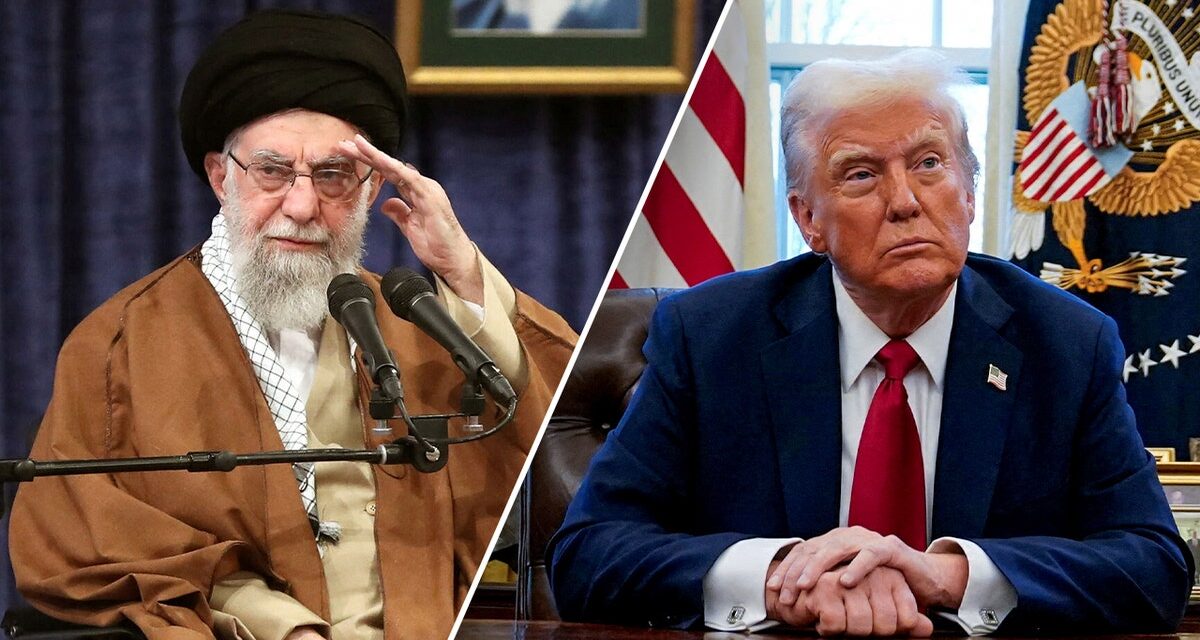In the early hours of the day, the political landscape of the United States was stirred by President Trump’s resolute stance regarding the ongoing discussions with Iran. The President has reiterated his commitment to not settle for any unfavorable agreements with the Islamic Republic, asserting that the nation will continue to pursue a path that is beneficial for American interests and allies.
As tensions between the United States and Iran have remained high, particularly since the withdrawal of the U.S. from the Joint Comprehensive Plan of Action (JCPOA) in May 2018, the current administration’s hardline approach towards Tehran has drawn both praise and criticism. Supporters of President Trump’s policies argue that a firm stance is necessary to prevent Iran from advancing its nuclear capabilities and destabilizing the Middle East.
In a recent press briefing, Trump stated, “We will not be signing any agreement that does not put America’s safety and security first. Iran has shown nothing but aggression, and we cannot turn a blind eye to their actions.” This statement was seen as a direct warning to any potential negotiators who might push for concessions that could undermine U.S. interests.
The backdrop of this dialogue is a complex web of geopolitical dynamics affecting not just the United States, but also its allies in the region. Nations such as Israel and Saudi Arabia have expressed deep concerns regarding Iran’s nuclear ambitions and its support for militant groups. The urgency for a solid strategy in dealing with Iran has never been more palpable, as the clock ticks down on potential agreements and deals.
One of the significant issues at hand is the mechanism for overseeing Iran’s nuclear activities. The JCPOA allowed critical inspections and oversight that were designed to ensure Iran remained compliant with the agreed terms. Critics of the current administration have argued that the lack of a similar framework would mean a reversion to unchecked nuclear development by Iran, a scenario that President Trump is eager to avoid.
Political analysts believe the outcome of these discussions will have long-term ramifications not just for U.S.-Iran relations, but also for the security architecture of the entire Middle East. Many are watching to see whether Trump’s approach will lead to a new agreement that could stabilize the region or if it will foment further conflict.
The rhetoric used by both sides has escalated in recent months. The Iranian government has accused the United States of economic warfare, particularly due to the sanctions imposed which have heavily impacted the Iranian economy. Conversely, Trump and his administration have consistently referred to Iran as a “state sponsor of terrorism,” arguing that its influence in the region is detrimental to peace efforts.
The negotiations are further complicated by Iran’s domestic politics. Iran’s hardliners have seized on the situation to bolster their positions and criticize any potential compromises with the West. In this political climate, the Iranian leadership’s willingness to engage in constructive dialogue is called into question.
For the United States, engaging with Iran is not merely a diplomatic endeavor; it represents a test of U.S. credibility on the global stage. Some experts warn that if Trump were to sign a bad deal, it would not only endanger American national security but also embolden adversaries and signal weakness in international negotiations.
As discussions continue, the need for a robust counter-strategy is crucial. The Trump administration has signaled that it is open to the possibility of negotiating a new agreement, provided that it includes stringent verification processes and consequences for any violations by Iran. This comes against the backdrop of a growing consensus among U.S. lawmakers about the need for a unified approach to Iran.
Within Congress, there is a mix of bipartisan support for a strong stance against Iran. Democrats and Republicans alike are recognizing the potential dangers of a nuclear-armed Iran. Nonetheless, partisanship often complicates capturing a unified strategy, which makes any potential agreement more contentious.
Furthermore, the economic impact of sanctions on Iran cannot be overlooked. The Iranian economy, which has been hit hard by stringent U.S. sanctions, is a focal point of concern for many nations that rely on oil imports from the country. This creates a complex economic relationship that could influence international support for U.S. policies.
There are concerns that prolonging negotiations could exacerbate relations not just with Iran, but with other nations that are tired of the U.S. approach to unilateral sanctions that impact global trade dynamics.
Looking ahead, Trump’s decision will also be scrutinized within the framework of the upcoming presidential elections. His approach to foreign policy will undoubtedly play a significant role in how he is perceived both domestically and internationally. Some members of Trump’s base may appreciate the tough rhetoric and refusal to bend on key issues, while others might call for more diplomatic engagements to avoid unnecessary conflict.
In conclusion, President Trump’s resolute refusal to endorse a bad deal with Iran underscores the challenges and complexities inherent in international diplomatic negotiations. The evolving situation will require astute political maneuvering, not just from the White House but also from Congress and global allies. As this significant chapter unfolds, the world watches closely to see how the balance of power in the Middle East continues to shift, and what impact that will have on global stability.
In the end, achieving a favorable agreement with Iran may be one of the most challenging foreign policy endeavors of the Trump administration’s tenure. The stakes are high, and any miscalculation could lead to far-reaching consequences, not only for Iran and the United States but for the broader global community. As observers tune in to future meetings and discussions, the outcome remains uncertain, but it is clear that the implications will resonate for years to come.
































